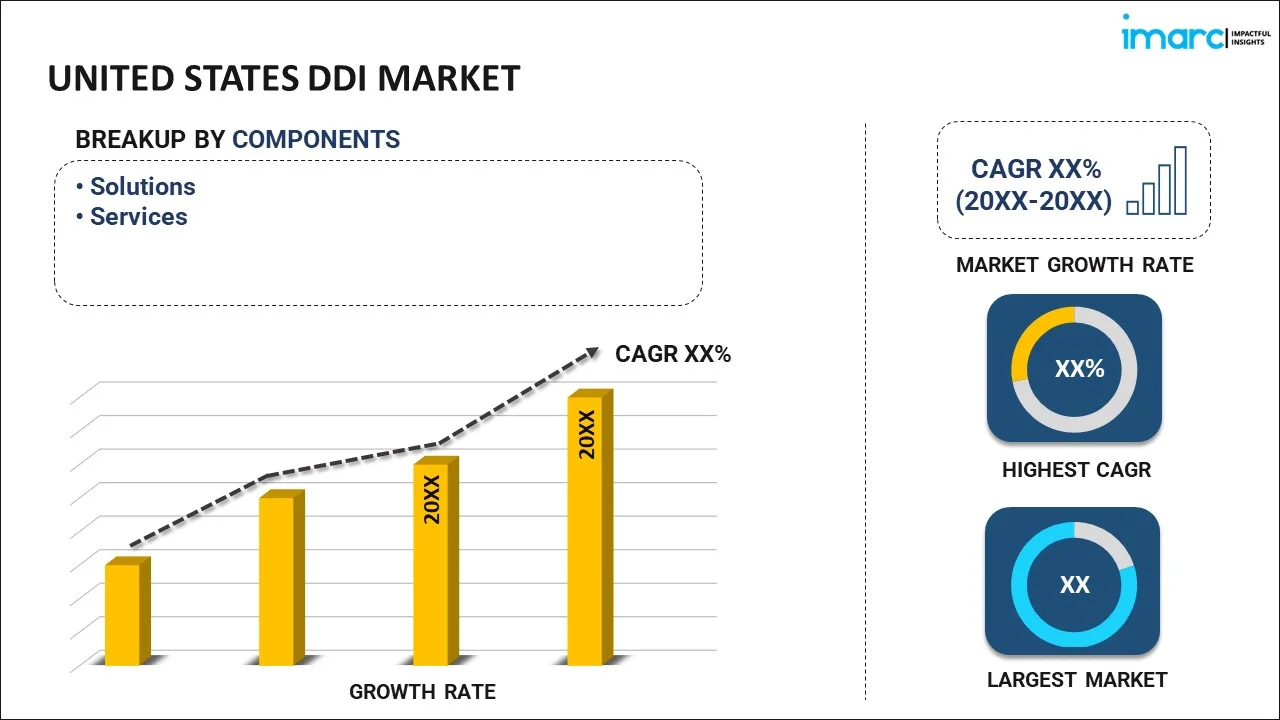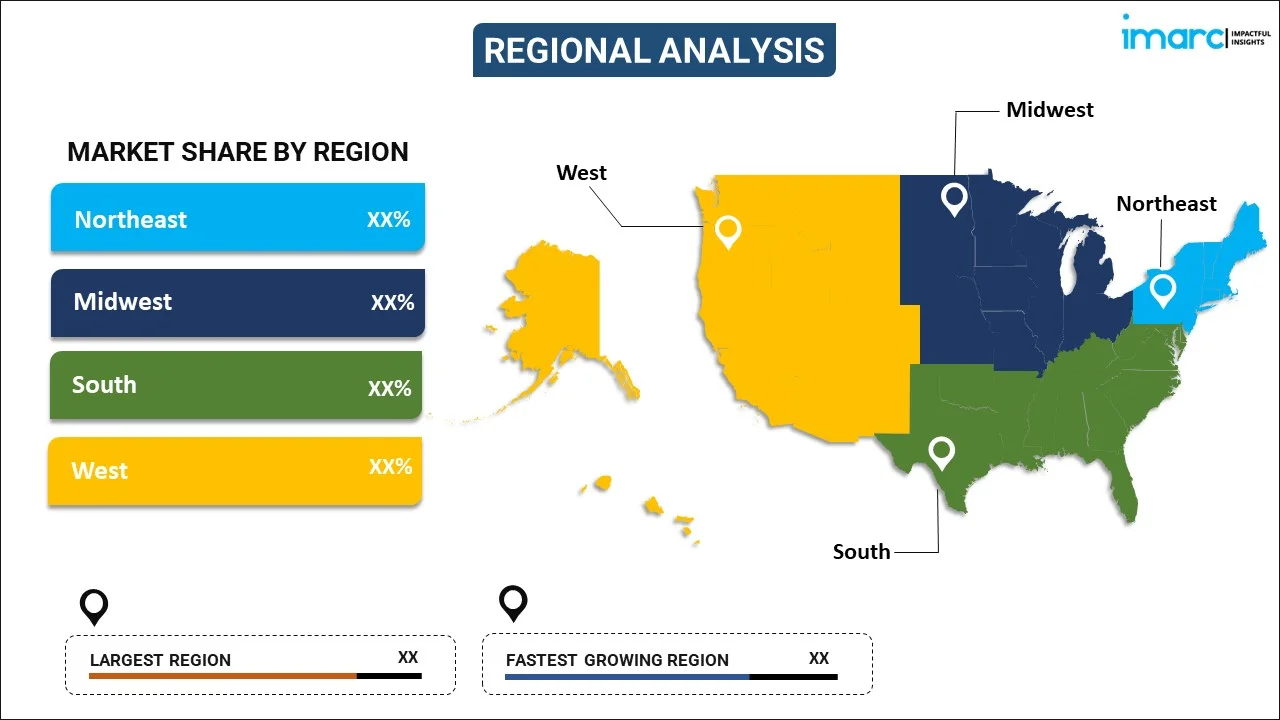
United States DDI Market Report by Component (Solutions, Services), Deployment Mode (On-premises, Cloud-based), Organization Size (Small and Medium-sized Enterprises, Large Enterprises), Application (Network Automation, Virtualization and Cloud, Data Center Transformation, Network Security, and Others), Industry Vertical (BFSI, Telecom and IT, Government and Defense, Healthcare and Life Sciences, Education, Retail, Manufacturing, and Others), and Region 2025-2033
Market Overview:
United States DDI market size reached USD 710.9 Million in 2024. Looking forward, IMARC Group expects the market to reach USD 2,682.8 Million by 2033, exhibiting a growth rate (CAGR) of 15.9% during 2025-2033. The rising prevalence of digital transformation, which often require scalable and efficient DDI solutions to manage the increasing complexity of their networks, is driving the market.
|
Report Attribute
|
Key Statistics
|
|---|---|
|
Base Year
|
2024 |
|
Forecast Years
|
2025-2033
|
|
Historical Years
|
2019-2024
|
| Market Size in 2024 | USD 710.9 Million |
| Market Forecast in 2033 | USD 2,682.8 Million |
| Market Growth Rate (2025-2033) | 15.9% |
United States DDI Analysis:
- Major Market Drivers: The escalating demand for efficient network management solutions drives significant adoption of United States DDI market share. Rising digital transformation initiatives across enterprises necessitate scalable DDI infrastructure. Growing cybersecurity concerns amplify the need for integrated DNS, DHCP, and IPAM solutions nationwide.
- Key Market Trends: Cloud-based DDI deployment models are witnessing accelerated adoption, enhancing United States DDI market analysis. IPv6 migration requirements fuel demand for advanced DDI solutions. Integration with artificial intelligence and automation technologies transforms traditional network management approaches significantly.
- Market Challenges: Complex legacy system integration poses significant implementation challenges for DDI solutions. Skills shortage in network management expertise hampers market expansion. High initial investment costs create barriers for small and medium-sized enterprises adoption.
- Market Opportunities: Remote work proliferation creates substantial opportunities for DDI solution providers. Edge computing expansion necessitates sophisticated network management capabilities. Government digitization initiatives present lucrative market prospects for DDI vendors.
Dynamic digital interviewing (DDI) is an innovative and adaptive approach to the traditional job interview process. DDI leverages technology to create a dynamic and interactive interview experience, allowing employers to assess candidates' skills, competencies, and cultural fit more effectively. Unlike static, one-size-fits-all interviews, DDI uses a database of questions tailored to specific job roles or industries. This customization ensures that candidates are evaluated on relevant criteria, providing a more accurate representation of their qualifications. Moreover, DDI often incorporates artificial intelligence algorithms to analyze not only what candidates say but also how they express themselves, including non-verbal cues. This comprehensive evaluation helps organizations make informed hiring decisions, streamline their recruitment processes, and enhance the candidate experience. As technology continues to shape the future of recruitment, DDI stands out as a dynamic solution that optimizes the interview process, ultimately leading to more successful and strategic hiring outcomes.
United States DDI Market Trends:
Cloud-First DDI Deployment Strategy
The move toward cloud-based DDI solutions is a core change in network management strategies. Organizations are increasingly shifting toward cloud-native architectures for improved scalability, lower operational expenses, and better agility. The trend continues to gather pace as enterprises see cloud DDI's ability to facilitate distributed workforce structures and multi-cloud setups. The embedding of AI and machine learning (ML) functionality in cloud-based DDI solutions makes possible predictive analytics, automated threat detection, and smart resource allocation. Additionally, cloud DDI solutions facilitate smooth integration with current cloud infrastructure, minimizing complexity and deployment timeframes. Service providers are reacting with the creation of integrated cloud DDI solutions that encompass enhanced security features, real-time monitoring functionality, and wide-ranging customization features. This evolution enables organizations' digital transformation programs while delivering solid network performance and security in wide-ranging operational contexts.
IPv6 Migration and Dual-Stack Implementation
The IPv4 to IPv6 protocol shift marks an essential infrastructure transformation fueling United States DDI market growth. Companies are under mounting pressure to adopt dual-stack models supporting both IPv4 and IPv6 addressing methodologies in tandem. Complexity of this migration requires cutting-edge DDI solutions able to handle hybrid network environments with ease. Advanced DDI solutions offer automated IPv6 address assignment, advanced network discovery features, and strong conflict resolution tools. The trend goes beyond mere address management to encompass IPv6-specific security aspects, routing optimization, and performance monitoring needs. DDI solutions are utilized by organizations to reduce the risks of migration while providing uninterrupted network availability during the transition period. Service providers complement their DDI offerings with custom IPv6 migration tools, consulting services, and best-practice guidelines that speed up deployment schedules and lower operational disruptions.
Integration with Network Security and Zero Trust Architectures
The intersection of DDI solutions with next-generation security frameworks is a paradigm change towards end-to-end network protection approaches. Organizations increasingly expect DDI platforms that can smoothly integrate with zero trust security architectures, offering detailed visibility and management of network access patterns. This wave includes real-time threat intelligence integration, automated policy enforcement, and dynamic segmentation features across DDI infrastructures. Present-day DDI solutions integrate behavioral analysis, anomaly detection, and high-speed incident response mechanisms that improve overall network security postures. Integration also includes compliance management, audit trail creation, and forensic analysis features that help with regulatory compliance and internal security policies. Service providers create detailed security-focused DDI solutions that offer threat hunting features, automated remediation processes, and enhanced reporting capabilities. This shift makes DDI solutions integral parts of enterprise security frameworks instead of being customary tools for managing networks.
United States DDI Market Segmentation:
IMARC Group provides an analysis of the key trends in each segment of the market, along with forecasts at the country level for 2025-2033. Our report has categorized the market based on component, deployment mode, organization size, application, and industry vertical.
Component Insights:

To get more information on this market, Request Sample
- Solutions
- Services
The report has provided a detailed breakup and analysis of the market based on the component. This includes solutions and services.
Deployment Mode Insights:
- On-premises
- Cloud-based
A detailed breakup and analysis of the market based on the deployment mode have also been provided in the report. This includes on-premises and cloud-based.
Organization Size Insights:
- Small and Medium-sized Enterprises
- Large Enterprises
The report has provided a detailed breakup and analysis of the market based on the organization size. This includes small and medium-sized enterprises and large enterprises.
Application Insights:
- Network Automation
- Virtualization and Cloud
- Data Center Transformation
- Network Security
- Others
A detailed breakup and analysis of the market based on the application have also been provided in the report. This includes network automation, virtualization and cloud, data center transformation, network security, and others.
Industry Vertical Insights:
- BFSI
- Telecom and IT
- Government and Defense
- Healthcare and Life Sciences
- Education
- Retail
- Manufacturing
- Others
The report has provided a detailed breakup and analysis of the market based on the industry vertical. This includes BFSI, telecom and IT, government and defense, healthcare and life sciences, education, retail, manufacturing, and others.
Regional Insights:

- Northeast
- Midwest
- South
- West
The report has also provided a comprehensive analysis of all the major regional markets, which include Northeast, Midwest, South, and West.
Competitive Landscape:
The market research report has also provided a comprehensive analysis of the competitive landscape in the market. Competitive analysis such as market structure, key player positioning, top winning strategies, competitive dashboard, and company evaluation quadrant has been covered in the report. Also, detailed profiles of all major companies have been provided.
Recent News and Development:
- In August 2024, At Black Hat 2024, Infoblox launched its Ecosystem Program and portal to strengthen joint product offerings through validated integrations, enhancing DNS security and networking. The program enables ISV partners to leverage Infoblox’s DDI data, threat intelligence, and APIs to build innovative solutions. Featuring tiered partner levels (Basic, Certified, Strategic), it ensures rigorous testing, reliable integrations, and customer confidence. The portal helps enterprises easily discover certified integrations for improved security and operational efficiency.
United States DDI Market Report Coverage:
| Report Features | Details |
|---|---|
| Base Year of the Analysis | 2024 |
| Historical Period | 2019-2024 |
| Forecast Period | 2025-2033 |
| Units | Million USD |
| Scope of the Report | Exploration of Historical and Forecast Trends, Industry Catalysts and Challenges, Segment-Wise Historical and Predictive Market Assessment:
|
| Components Covered | Solutions, Services |
| Deployment Modes Covered | On-premises, Cloud-based |
| Organization Sizes Covered | Small and Medium-sized Enterprises, Large Enterprises |
| Applications Covered | Network Automation, Virtualization and Cloud, Data Center Transformation, Network Security, Others |
| Industry Verticals Covered | BFSI, Telecom and IT, Government and Defense, Healthcare and Life Sciences, Education, Retail, Manufacturing, Others |
| Regions Covered | Northeast, Midwest, South, West |
| Customization Scope | 10% Free Customization |
| Post-Sale Analyst Support | 10-12 Weeks |
| Delivery Format | PDF and Excel through Email (We can also provide the editable version of the report in PPT/Word format on special request) |
Key Benefits for Stakeholders:
- IMARC’s industry report offers a comprehensive quantitative analysis of various market segments, historical and current market trends, market forecasts, and dynamics of the United States DDI market from 2019-2033.
- The research report provides the latest information on the market drivers, challenges, and opportunities in the United States DDI market.
- Porter's five forces analysis assist stakeholders in assessing the impact of new entrants, competitive rivalry, supplier power, buyer power, and the threat of substitution. It helps stakeholders to analyze the level of competition within the United States DDI industry and its attractiveness.
- Competitive landscape allows stakeholders to understand their competitive environment and provides an insight into the current positions of key players in the market.
Key Questions Answered in This Report
The DDI market in the United States was valued at USD 710.9 Million in 2024.
The United States DDI market is projected to exhibit a CAGR of 15.9% during 2025-2033, reaching a value of USD 2,682.8 Million by 2033.
The rising prevalence of digital transformation initiatives requiring scalable DDI solutions, escalating demand for efficient network management, proliferation of connected devices, expansion of cloud services, increasing network infrastructure complexity, surge in remote work adoption, and regional IPv6 migration driven by IPv4 address exhaustion are the primary market drivers.
Need more help?
- Speak to our experienced analysts for insights on the current market scenarios.
- Include additional segments and countries to customize the report as per your requirement.
- Gain an unparalleled competitive advantage in your domain by understanding how to utilize the report and positively impacting your operations and revenue.
- For further assistance, please connect with our analysts.
 Request Customization
Request Customization
 Speak to an Analyst
Speak to an Analyst
 Request Brochure
Request Brochure
 Inquire Before Buying
Inquire Before Buying




.webp)




.webp)












